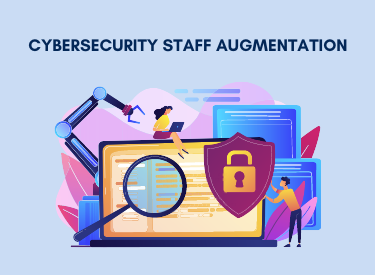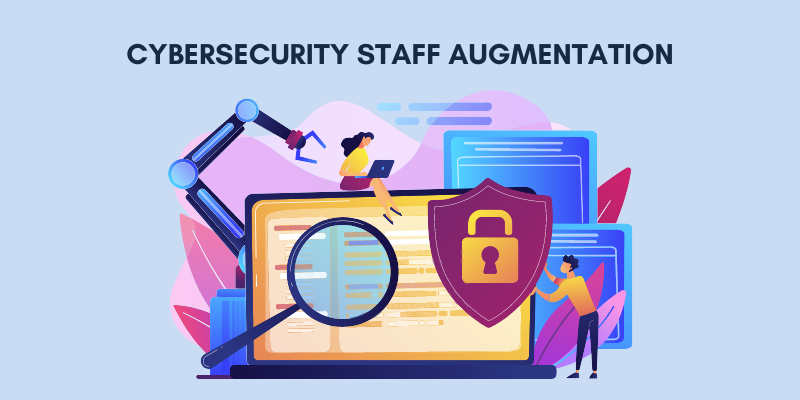What Is Cybersecurity Staff Augmentation?


Cybersecurity is a must-have in any IT organization. However, due to increased hiring costs and labor shortages, establishing a security team with the proper talents is more difficult than ever. As a result, more businesses are turning to cybersecurity staff augmentation to help them overcome these issues. Here’s what you should know about cybersecurity staff augmentation and how to get the most out of your investment.
What Is Cybersecurity Staff Augmentation?
Cybersecurity staff augmentation uses outside resources to add cybersecurity experts to your IT department. It lets you change and grow your security team to monitor, find, investigate, and respond to threats while keeping your business flexible.
Cybersecurity staff augmentation services can fill skill gaps in many areas such as preventative maintenance, continuous proactive monitoring, alert ranking and management, threat response, recovery and remediation, root cause investigation, security refinement, and so on.
What Are the Advantages of Cybersecurity Staff Augmentation?
Cybersecurity staff augmentation provides you with on-demand access to security specialists with relevant skills. By delegating specialized or time-consuming tasks, you may extend your security capabilities to remain agile while alleviating pressure on your internal IT staff.
Staff augmentation can also assist you in lowering the cost of hiring and keeping an in-house workforce. Your service provider will handle screening and onboarding so you can hire the right people and start the ground running straight away. To help you save money on overhead, your hiring agency will also handle administrative responsibilities like payroll.
Read more: Managed IT Services vs. IT Staff Augmentation
What Roles Can a Cybersecurity Staff Augmentation Solution Fill?
Cybersecurity is a difficult and rapidly changing discipline. A staffing agency can assist you in fast adapting to the threat landscape by providing you with access to the right personnel at the right time. Here are the key roles it can assist you in filling:
- Virtual Chief Information Security Officer (vCISO): Architect your security program and oversee all the components.
- Analysts: Compile, organize, and interpret data to inform security strategies.
- Auditors: Examine your IT infrastructure to guarantee compliance with regulatory requirements.
- Technical writers: Compile reports based on data analysis and prepare documentation.
- White hat hackers: Conduct penetration testing to find flaws in your systems and networks.
Virtual CISO
A chief information security officer (CISO) is the chief architect of a cybersecurity program. They oversee all aspects of risk assessments, compliance certifications, penetration testing, and cybersecurity tool selection.
CISOs, once an executive payroll position in a large firm, have evolved into virtual and part-time roles for smaller businesses. Virtual CISOs are becoming increasingly popular in small and medium-sized enterprises.
Virtual CISOs are not only less expensive, but they are also more objective. They (and their team) rarely develop tunnel vision and extract security ideas from multiple industries simultaneously because they (and their team) service a portfolio of clients.
Selecting a virtual CISO is typically your first step when deciding to enhance your workforce for cybersecurity purposes. These professionals supervise the other members of your cybersecurity team and report to you directly.
Analysts
Many aspects of cybersecurity require individuals to collect, manage, and interpret data. These individuals are analysts. Depending on your organization’s security requirements, you may require one to several analysts on your cybersecurity team.
Auditors
Auditors, sometimes confused with analysts, seek flaws in your current security system. These people are critical thinkers who pay close attention to detail.
Typically, auditors play an important role in assisting your firm in meeting various compliance regulations, such as the CCPA or GDPR. While an auditing process is never pleasant, these professionals identify problems before anyone outside your organization. Auditors safeguard you from lawsuits, discover key flaws in your data management process, disclose employee policy violations, and much more.
Technical Writers
A technical writer is another important function in your security personnel augmentation. Technical writers, second only to a virtual CISO, are among the most important team members in developing a successful security program.
These professionals take information from analysts and turn it into reports, network diagrams, disclosures, policy manuals, and instruction manuals. Quality technical writing ensures that your firm can sustain what the enhanced personnel developed at the end of your cybersecurity setup and/or updates.
Technical writers have years of research and writing skills. It is their responsibility to make difficult information understandable and concise. Many of their outputs become staff training curriculums.
White Hat Hackers
It’s difficult to tell how secure your network is unless someone attempts to a break in, which is where white hat hackers come in.
Pen testing, also known as penetration testing, is one of the most effective methods of discovering cybersecurity threats to your firm. However, pen-testing necessitates ground rules, expert data collection (analysts), non-disclosure agreements, authentic hack attempts, and official reporting.
White hat hackers get into your network on purpose to see how simple it is to do so. These individuals work tirelessly to breach your cybersecurity measures under the direction of the CISO. Naturally, they carry out their responsibilities following rigorous confidentiality requirements and openly disclose their efforts at the end of pen-testing.
These penetration tests enable you to enhance your security tools and processes. Furthermore, white hat hackers can assist you in assessing the quality of your cybersecurity concerns. Your hacker, for example, may have breached one or two barriers. Still, layered protection kept them from obtaining any crucial data. Although no successful breach is ideal, the hacker could not cause any actual harm, rendering this specific event insignificant.
Read more: How To Handle The Top 5 IT Staff Augmentation Challenges
How Can You Make the Most of Cybersecurity Staff Augmentation Services?
Here are a few of the most cost-effective methods to use a cybersecurity staff augmentation:
Build a Security Awareness Program
Many regulations make employee education a mandatory necessity. A staff augmentation service connects you with professionals who can create an employee training program that integrates the most up-to-date best practices, threat intelligence, and response processes.
Support Compliance Audits and Reporting
Data collection and report compilation are time-consuming and labor-intensive tasks. A staff augmentation service provides resources knowledgeable in these duties to assist you in meeting complicated auditing needs without incurring the expense of recruiting a big in-house team.
Infrastructure Security Testing
Pen-testers can provide an unbiased perspective of your security posture by extensively testing your IT infrastructure or technologies under development. These experts have access to the most recent threat intelligence, ensuring that you have covered all of your bases.
Perform Data Breach and Crisis Management
Navigating a data breach necessitates all hands (and more) on deck. Using a staff augmentation agency is your best bet for gaining rapid access to qualified specialists to address these emergency scenarios. You can respond to incursions promptly, undertake cleanup, and minimize damage.
Control Documentation Efforts
Developing technical documentation for security and compliance measures is an important but often disregarded undertaking. Instead of scurrying at the last minute to compile documentation (for example, for a compliance audit), bring in a technical writer regularly to ensure that everything is up to date.
Support Product Development
When developing a digital product, specific cybersecurity knowledge may be required at various phases of the development process to inform feature design or help to test. A staffing augmentation firm can provide you with these skills while decreasing expenses.
Who Needs Cybersecurity Staff Augmentation?
Most firms that gather, retain, and share customer data will require the addition of security personnel at some point. However, the staff augmentation requirements of each firm differ substantially.
Large Corporations
Large organizations may already have a full-time CISO and cybersecurity team in place. Full-time CISOs, on the other hand, realize that they are not always objective. As a result, businesses may hire temporary experts to provide an outside perspective, conduct pen-testing, or audit present policies/procedures.
Medium-sized Enterprises
Medium-sized organizations likely have a well-functioning IT staff but a lax cybersecurity program. It makes sense for these firms to beef up their security teams to implement security policies, standards, and technologies.
The IT department can keep what the augmentation team created or retain certain individuals long-term.
Small Enterprises
Small firms frequently believe they are not at risk of a security breach, even though they are frequent targets for hackers. However, most small businesses have limited resources. They cannot afford more than a couple of IT employees, let alone a full-time cybersecurity team.
Virtual CISOs work with small organizations and may urge staff augmentation on occasion. This method safeguards the small firm from lost or stolen data while remaining within an acceptable budget.
Final Thoughts
You can improve your security to an acceptable level through cybersecurity staff augmentation. It helps ensure that organizations are safe from security breaches and follow all the rules and laws in place. All of this is done flexibly and cost-effectively, which is hard to do with a full-time security team. You can get the best cybersecurity workers and experience without expanding your payroll. So, who needs cybersecurity staff augmentation? Everyone.
